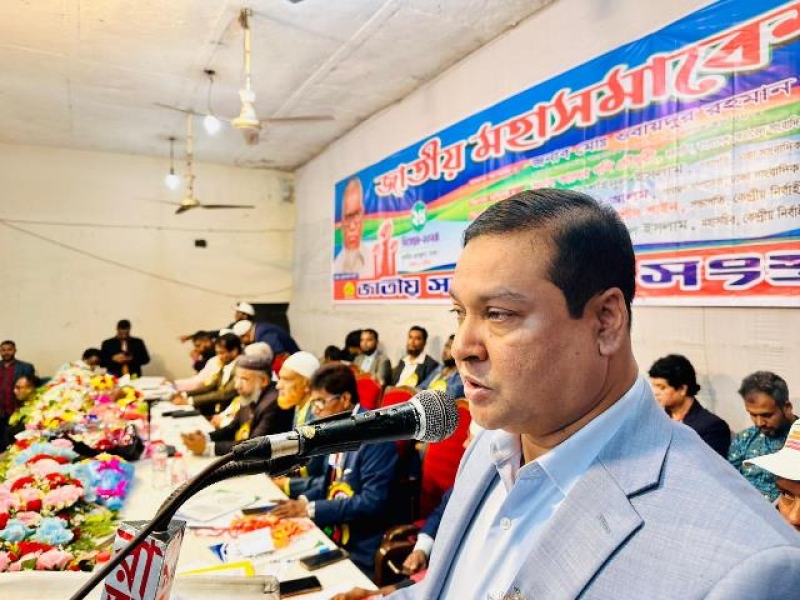- Lab Tests Find 67% Adulteration in Branded Milk Powder |
- DNCC Sets New House Rent Rules, Eases Burden for Tenants |
- RAB Officer Killed, Three Injured in Sitakunda Attack |
- Bangladesh Plans Padma Barrage, First Phase at Tk34,608cr |
- US Expands Trump’s Gaza Peace Board, Invites More States |
“Journalistic integrity drowning amid flood of misinformation, erosion of ethics”

Kader Gani Chowdhury, Secretary General of the BFUJ, addressing a conference
Dhaka, Dec 29 - Kader Gani Chowdhury, Secretary General of the Bangladesh Federal Union of Journalists (BFUJ), has said that political bias, unethical journalism, yellow journalism, and misinformation are tarnishing the dignity of journalists.
He emphasized that objective, honest, and fearless journalism benefits the country and its people, and there can be no compromise on the question of factual journalism. He lamented that interest-driven journalism has unfortunately taken over objective reporting.
The BFUJ Secretary General made the remarks at a grand conference of journalists organized by the National Journalists Association at the National Press Club auditorium on Saturday.
Presided over by the President of the National Journalists Association, Mominur Rashid Shine, the discussion featured BFUJ Acting President Obaidur Rahman Shaheen, Senior Assistant Secretary General Bashir Jamal, President of Dhaka Union of Journalists Shahidul Islam, and General Secretary Khurshid Alam. The event was conducted by the General Secretary of the National Journalists Association, Kamrul Islam.
BFUJ Secretary General Kader Gani Chowdhury said, "The media in Bangladesh is facing various crises created by the previous fascist government. Over the past 15 years, the media has been unable to call a spade a spade or expose the crimes, disappearances, and corruption of the fascist regime. Autocrats have always suppressed the voice of the media to prevent people from knowing about their misrule, which has eroded public trust in the media."
He added, "The media was supposed to stand by the people, but somehow a gap has developed between them. Previously, the public used to criticize the police and doctors, but now journalists are also added to the list."
Chowdhury further remarked, "At press conferences, instead of questioning Sheikh Hasina about disappearances and murders, many sycophant journalists would praise her. These events turned into tributes for the Prime Minister. Such journalists played a significant role in elevating Sheikh Hasina from an autocrat to a super-autocrat, from a fascist to a super-fascist. We must acknowledge this truth."
Acting BFUJ President Obaidur Rahman Shaheen said, there is a real crisis in public-interest journalism in the country, and reforms are urgently needed to overcome it. He suggested that the interim government currently in power should address these reforms.
Bashir Jamal stressed the need to ensure the social, economic, physical, and mental security of journalists. He pointed out that reforms in journalism would not be possible if media outlets remain tools for the profit-making motives of their owners. Bashir urged the newly formed Media Reform Commission to engage with journalists nationwide and initiate changes from the grassroots level.
Mominur Rashid Shine stated that journalism outside Dhaka, particularly in rural areas, is yet to receive professional recognition. He stressed that without enhancing journalists' dignity and financial stability, it would be impossible to restore a conducive environment for journalism.
Shahidul Islam highlighted the unresolved murder case of journalist couple Sagar-Runi, now 12 years old.
"We have not received justice yet," Shahidul said, although he remains hopeful in the wake of the political upheaval the country went through this year.
"Now that fascism has been eradicated, we urge the current government to immediately ensure justice for the murder of Sagar-Runi. While we demand a Journalist Protection Act, we also want to ensure that no journalist is harmed during any political party's programs," he added.-UNB

